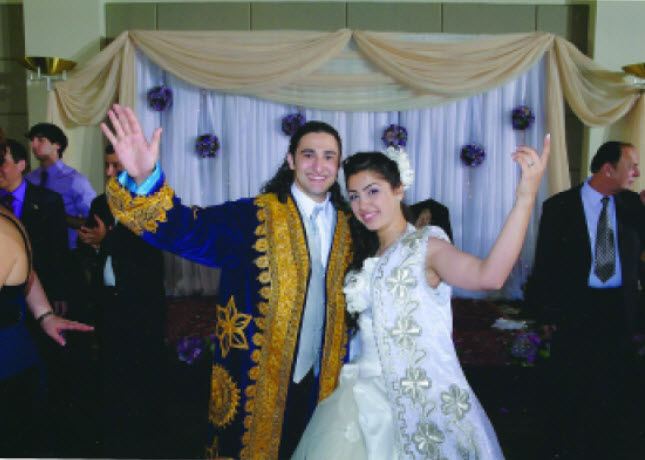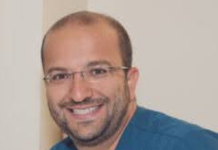Step inside an exotic modern Orthodox Bukharian Atlanta wedding with fantastical tradition and overflowing food.
Our synagogues and customs are quite varied, but there’s probably nothing more bounteous than a Bukharian simcha. As a member of the dynamic Bukharian Congregation Beth Itzhak in Norcross, Marieta Iskhakov shares the details of her wedding that will bring joy and make your mouth water.
Bukhara is one of the 12 provinces in Uzbekistan, a landlocked sovereign nation in Central Asia north of Afghanistan. Iskhakov immigrated to Israel (from Bukhara) as a youth, came to New York in 2004, then moved to Atlanta in 2010.
Jaffe: You consider yourself Modern Orthodox. How was your wedding here in Atlanta different from an Ashkenazi traditional wedding?
Iskhakov: Bukharians are Sephardic with other cultures mixed in: Persian, Mediterranean. That being said, with our crowd of 300, we held the wedding at Congregation Beth Jacob and brought in the head Bukharian rabbi from New York, along with the band and catering.
Jaffe: I would have thought that Atlanta would have adequate kosher choices and supplies.
Iskhakov: We have very specific qualities and foods (especially the meats) that are best found in New York. Even the dishes were bought there and shipped to Atlanta. My poor fiancé had to wash (tuvel) every plate by hand in the mikvah.
My father-in-law was most gracious in wanting everything “just right.”
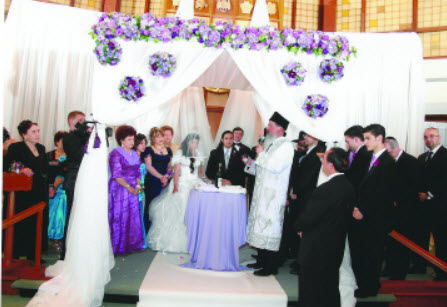
Jaffe: Describe how the ceremony and unique Bukharian traditions unfold.
Iskhakov: We have the traditional chuppah, wine, blessings and breaking of the glass.
My mother handmade my wedding dress. After the ceremony, the bride and groom (and some family members) wear chapans, large coats embroidered in metallic threaded flowers, and dance traditional Bukharian dances.
Jaffe: I get that food is very important.
Iskhakov: Our goal was to have the highest quality and variety so that there is something for everyone. Happy guests are what’s most important. One thing that may be different is that we have a huge buffet before the ceremony. The groom and I did not attend, but my recollection was that it had a variety of fancy salads, butterfish, lox, smoked fish and veggies. I think meat also, but note that we start over with a new dish after eating the fish between the meat courses.
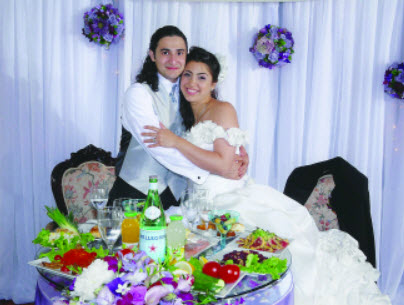
In the main reception room, the liquor and appetizers were already on the tables. More fancy salads, beets, eggplant, tuna tartar, sushi, vegetables. We eat tandoori bread that looks like a giant round, thick pita sprinkled with sesame seeds.
Later, there are several main entrees: chicken, various skewers and shish kebabs, lamb chops, and samosas stuffed with minced lamb. Some things are served in tandoors. Lots of Grey Goose too!
The staff rolled in tables for the desserts. I will say that I do not remember this because I was so tired. All I wanted to do at that point was to go home. My cake was about the only thing done locally, and it had elaborate purple flowers.
Another tradition is during the reception, right before dessert. We had a group meal called osh plov, made in a giant cast iron cauldron, huge platters of rice, lamb, and carrots topped with green onions. The symbolism of this is sharing a meal with everyone as a community.
Jaffe: Describe how the reception was set up.
Iskhakov: We had two separate rooms with identical food. One was a more observant side with a mechitzah (separation panel) so the men and women can dance separately. One room had a Bukharian band from New York; the other had a DJ who took requests. I was running between rooms to see everyone! My husband and I were elevated on our own private table with king and queen chairs upon a traditional rug.
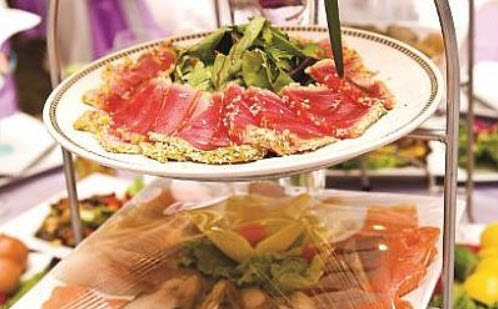
Jaffe: Looking back, what you would say?
Iskhakov: Our tradition may be a bit different in that the groom’s family pays for the wedding. My family gave the engagement party earlier in New York. In our tradition there is the exchange of jewelry from family members to the couple.
This was a several-day affair with Shabbat dinner and lunch the Saturday after the wedding.
We went to Israel for our honeymoon…nothing can compare to that!
credit to atlantajewishtimes.timesofisrael


